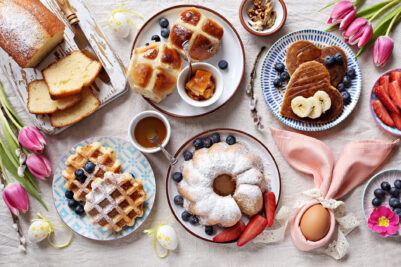
Easter is a joyous time of year which coincides with Spring, heralding a time of new life and new beginnings. This Christian holiday is celebrated in many ways around the world, and traditional foods are very much part of the proceedings. Easter eggs, hot cross buns and Simnel cake are just some of the goodies that are enjoyed by all. The good news for anyone following a free-from diet is that traditional Easter recipes can easily be adapted to cater for various dietary restrictions. Whether it’s vegan, gluten-free, dairy-free or nut-free, you can prepare a delectable Easter feast without compromising on flavour or tradition.
Celebrating Easter with inclusivity at the table
Some traditional Easter foods, such as roast lamb, chocolate Easter eggs and hot cross buns, may seem to be off limits to those on special diets. However, celebrating Easter with dietary restrictions, whether due to allergies, intolerances or other dietary preferences, can still be enjoyable for everyone at the table.
Instead of a traditional roast dinner of lamb, opt for plant-based alternatives for the main meal, which can be both delicious and satisfying. If dealing with allergies or intolerances, explore free-from and allergen-friendly recipes and look for alternative ingredients and substitutions. Always check labels for hidden allergens or non-vegan ingredients.
When it comes to sweet treats and Easter gifts, swap traditional chocolate for dairy-free and vegan options. Try your hand at home baking and create your own free-from Easter goodies that cater for various dietary restrictions.
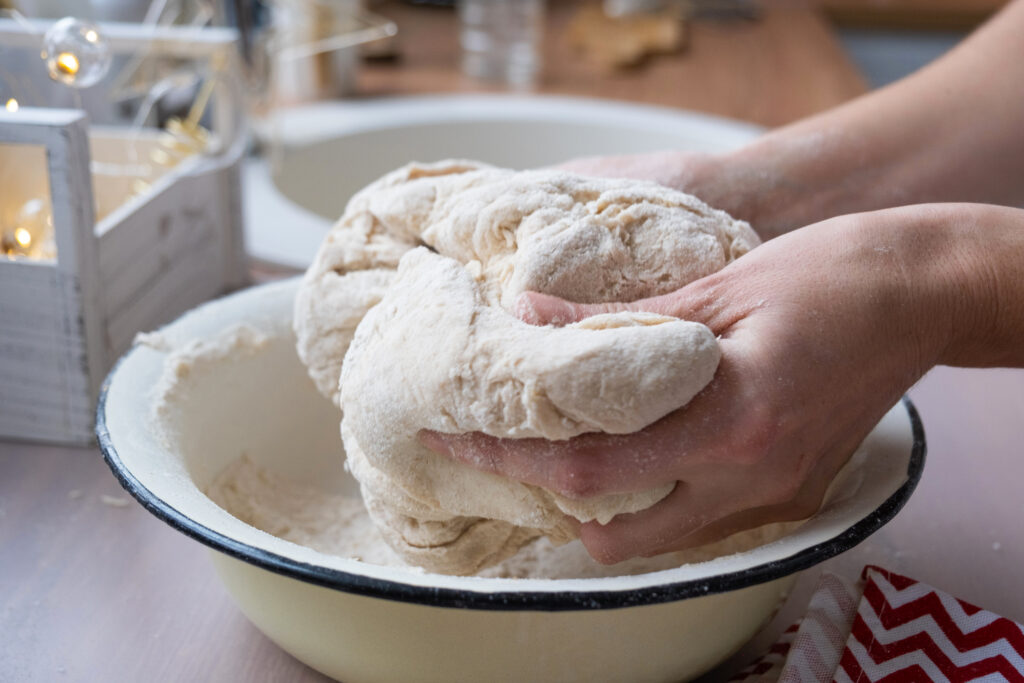
The foundation of free-from feasting: Essential ingredients for allergy-friendly cooking
Cooking a meal for guests with dietary requirements requires careful consideration of ingredients to ensure that everyone at the table can indulge in the festive fare. Rice, buckwheat, oat and chickpea are just some of the many gluten-free flours that can be used as alternatives to wheat flour in cooking and baking. Non-dairy milks include almond, soya, rice, oat and coconut, among others. Egg replacers include ground chia seeds or flaxseeds, silken tofu or aquafaba, which is the liquid found in tinned chickpeas.
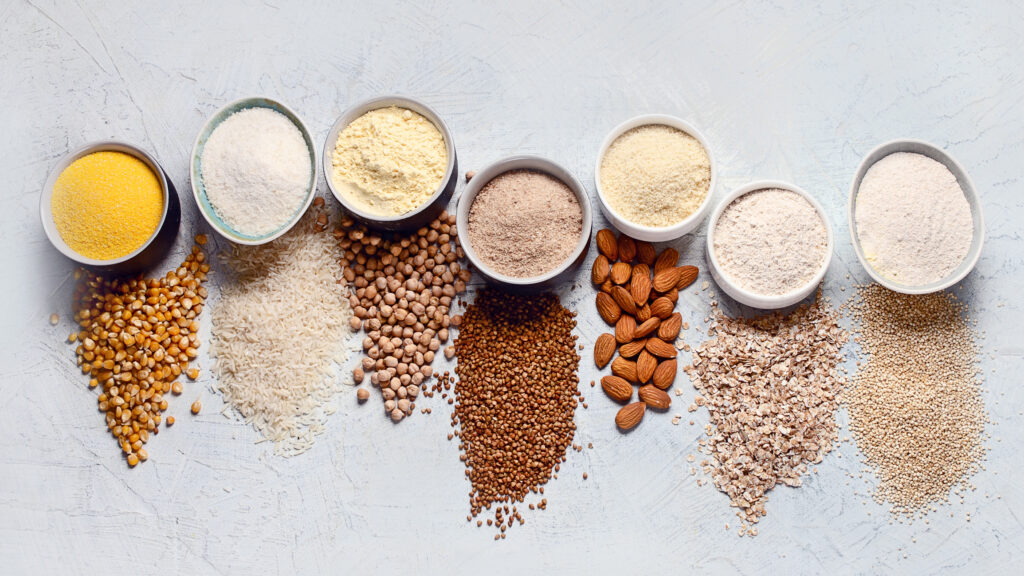
Quinoa, rice, buckwheat, amaranth, and millet are all good substitute grains for those following gluten-free diets. To replace butter in cooking and baking, you can use olive oil, coconut oil, nut butter or mashed banana. Look for dairy-free and nut-free chocolate, or consider using carob as an alternative, which is also free from caffeine.
Chia seeds, flaxseeds, hemp seeds, and sunflower seeds can add nutritional value to dishes without the need for nuts. Toasting them can add a nutty flavour too. Be sure to read ingredient labels carefully and be aware of potential cross-contamination when cooking for people with food allergies.
Easter staples reimagined: Free-from Easter eggs and hot cross buns
Eggs of all kinds are synonymous with Easter as they symbolise rebirth and new life. In pagan times they were given as gifts to represent the coming of Spring. Christianity then adopted the egg as a symbol of the resurrection of Christ, as it represents the tomb from which he appeared. Easter egg hunts are said to have become popular during medieval times, while decorating Easter eggs is another popular activity which has been enjoyed by families across the world for centuries.
Today, in the UK, we buy around 80 million chocolate eggs each year, with many people giving them to family and friends as gifts during the Easter weekend. Look for dairy-free and vegan varieties to ensure that everyone at your celebration is catered for. Here at Real Foods we stock a range of free-from Easter eggs including gluten-free, dairy-free and no-added-sugar varieties.
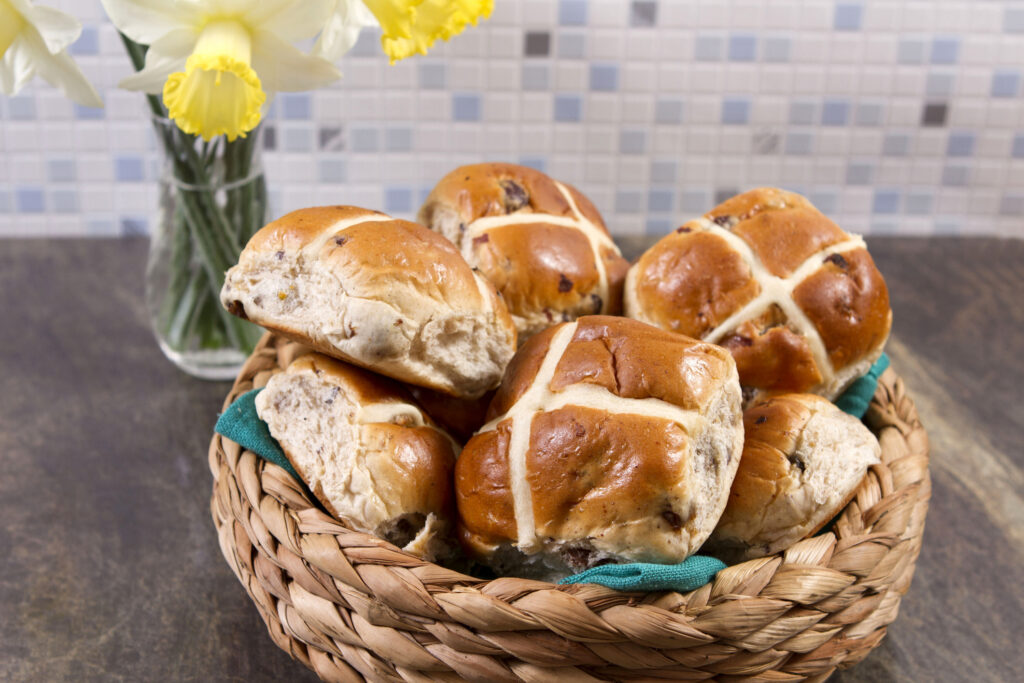
With their classic cross motif and delectable spiced dough, hot cross buns are another absolute staple at Easter time. These deliciously sticky buns are eaten at Easter because they symbolise the crucifixion of Christ and mark the end of Lent. Here is a healthier twist on the traditional recipe that’s free from dairy and eggs, and uses wholemeal flour instead of white.
The main event: Nutritious and delicious alternatives for Easter mains
Roast lamb, seasoned with rosemary and garlic, is a traditional Easter main meal that is commonly eaten in the UK. However, if you are catering for vegetarian or vegan guests, our Real Foods recipe archive can provide you with plenty of plant-based inspiration!
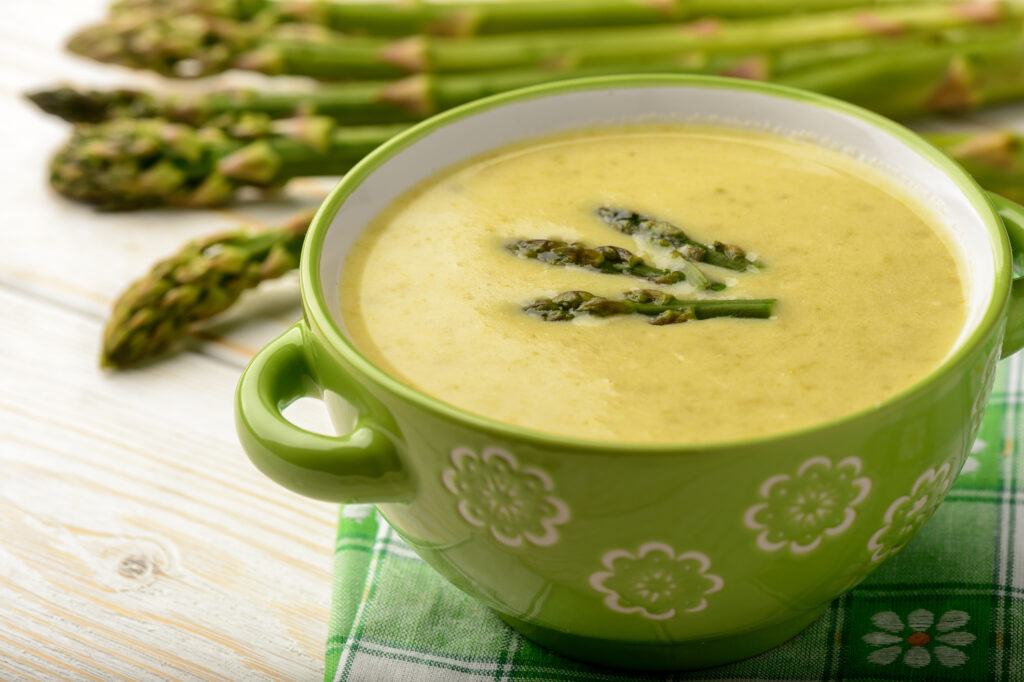
Make the most of Spring vegetables and start your Easter lunch with this nutritious Asparagus and Salsify Soup. For the main course, why not prepare this delicious Leek, Carrot and Feta Savoury Cake? It makes a great centrepiece for the table and works equally well with a salad or vegetable side dishes. This Spring Vegetable Risotto also makes good use of seasonal veg and would make an excellent main dish. Why not incorporate the traditional flavours of rosemary and garlic in other dishes, such as this
Roasted Squash and Fresh Rosemary Pesto Salad?
If you’re planning a more traditional roast dinner, then our Nut Roast, Mushroom and Pea Quinoa Loaf or
Vegan Quinoa Stuffed Aubergines would all provide good, plant-based options for the main meal.
Sides and salads: Colourful, nutrient-rich companions to your Easter spread
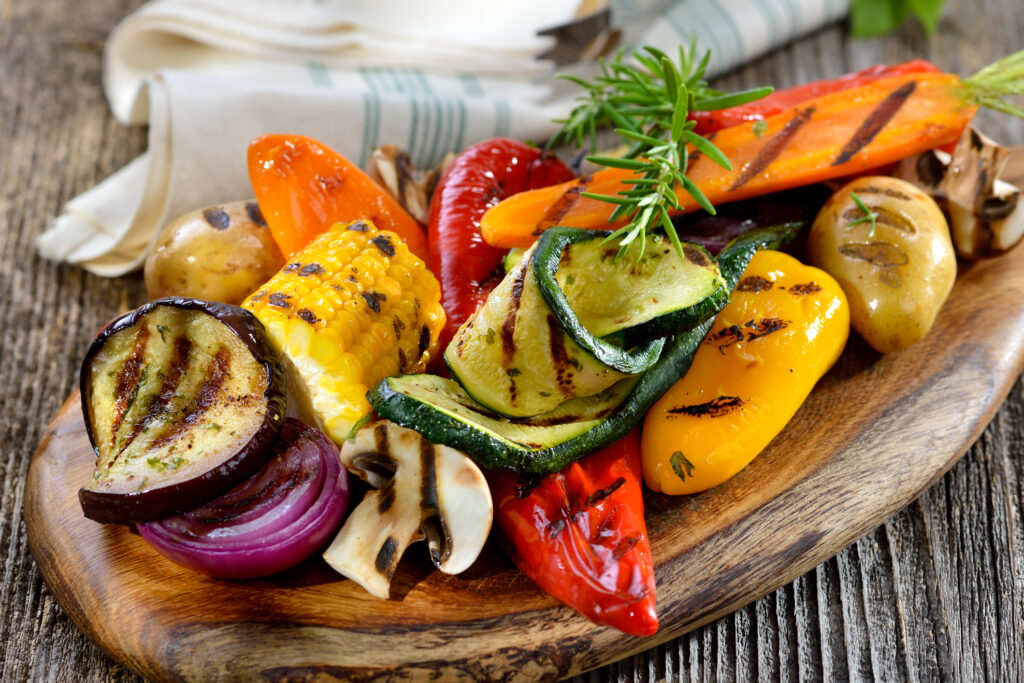
Embrace the freshness of Spring with colourful and flavourful side dishes to accompany your main meal. Roasted vegetables and nutrient-rich salads can be enjoyed by everyone, regardless of dietary restrictions.
Carrots are a must-have side dish as they are traditionally associated with Easter. This is perhaps because children would leave out carrots as a snack for the Easter bunny, in a similar way that they would leave out mince pies for Father Christmas. Roast your carrots in good quality olive oil with garlic and herbs for a deliciously simple side dish.
Other side dish options include sautéed greens with garlic and paprika, barbecued aubergine or crispy roasted sweet potatoes. For salad ideas, why not try our quinoa, avocado and pea salad or this wheat-free and dairy-free pearl barley salad?
Delectable desserts: Indulgent yet allergy-friendly treats for everyone
Although, strictly speaking, they are not a dessert, breaking open chocolate eggs to munch on after lunch is an enjoyable way to finish off your Easter feast. However, a classic Easter dessert that is enjoyed in the UK is Simnel cake. This light fruitcake is made with a mixture of dried fruits such as currants, raisins and candied peel. It is flavoured with spices such as cinnamon and nutmeg. The top of the cake is decorated with 11 marzipan balls, representing the 11 apostles, excluding Judas. To make the recipe vegan, substitute the butter with a dairy-free spread and use apple puree instead of the eggs. Swap the plain flour for a gluten-free variety to cater for guests avoiding gluten.
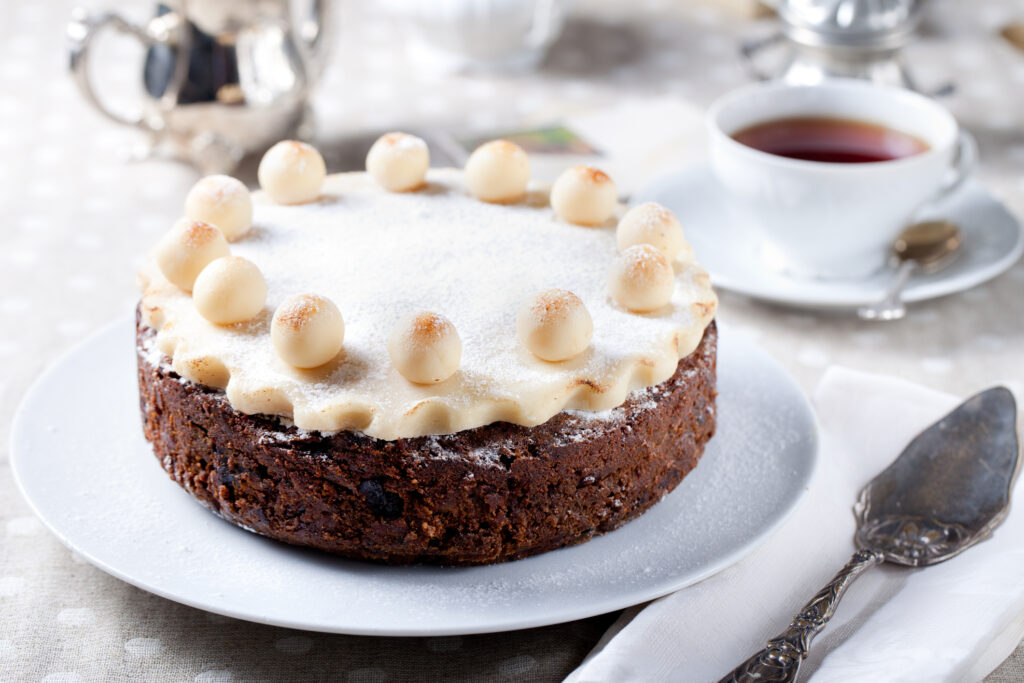
Again, you might want to make the most of seasonal produce when selecting your dessert options. Our zingy lemon pudding, apricot torte and rhubarb crumble are all made using fruits that are in season during Spring. What’s more, the crumble can be made gluten-free with oat or rice flour, which is an added bonus for your free-from Easter menu.
After dessert, you might like to serve some Easter biscuits with tea and coffee. These tasty treats, which are made with spices and currants, originate from the South-West of England. Here is our sugar-free twist on the recipe.
Global Easter traditions: A journey through international Easter dishes with a free-from twist
Around the world, Easter is celebrated with different dishes, so look no further if you’re seeking inspiration from other cultures! Many European countries mark the occasion with sweet breads, which can be adapted for free-from diets through careful ingredient substitutions. Bread has a strong association with Easter as it is said to symbolise the body of Christ. It was also served at The Last Supper.
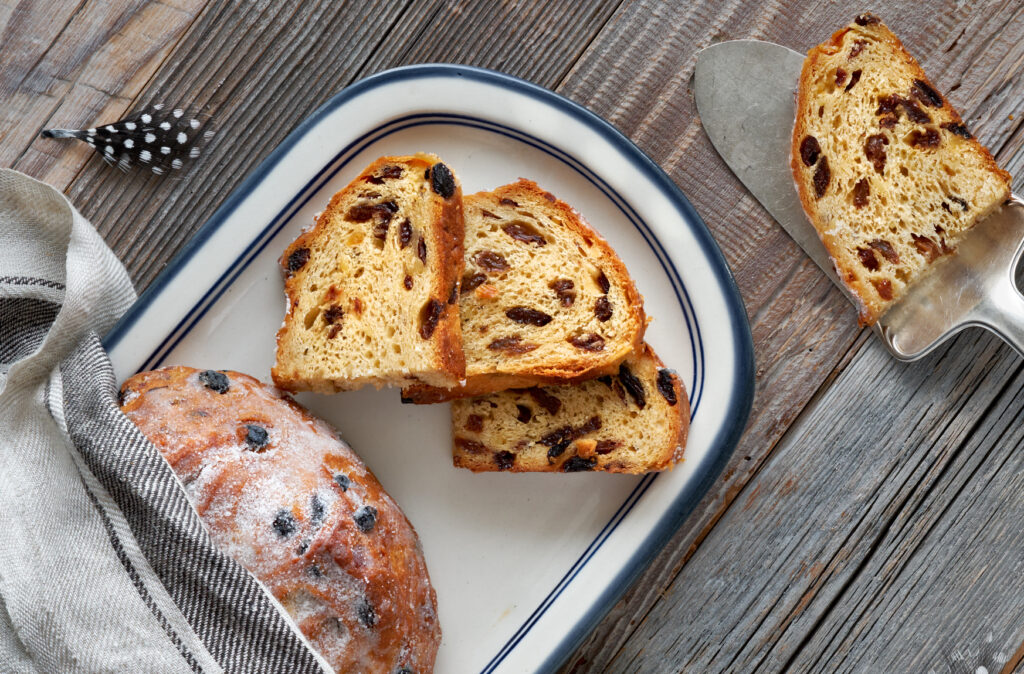
In Germany, osterbrot is a sweet Easter bread made with raisins and almonds. Kulich is a tall, cylindrical, sweet bread topped with icing or powdered sugar which is very popular in Russia. Another Russian delicacy that is enjoyed during Easter is Pashka, which is a sweet cheese dessert shaped like a pyramid and decorated with candied fruit. In Italy, Corona di Riso is a crown-shaped cake made with rice, almonds and candied fruit, which is said to represent the crown of thorns that Jesus wore. If these ideas have tickled your tastebuds and you’d like to find out more about Easter traditions from around the world, then take a look at our blog post here.
All these enticing Easter treats can be adapted to suit free-from diets by substituting the wheat flour for gluten-free options, and swapping the butter and milk for dairy-free varieties. Don’t forget that Real Foods has an extensive selection of free-from products to help with all your culinary creations.
Fostering new traditions with health and inclusivity at heart
Hopefully this blog post has inspired you to continue exploring and adapting traditional Easter recipes. Perhaps it has paved the way for more inclusive, health-conscious celebrations! If you’re looking for further inspiration, sign up to the Real Foods newsletter for more vegan recipes and plant-based news.







